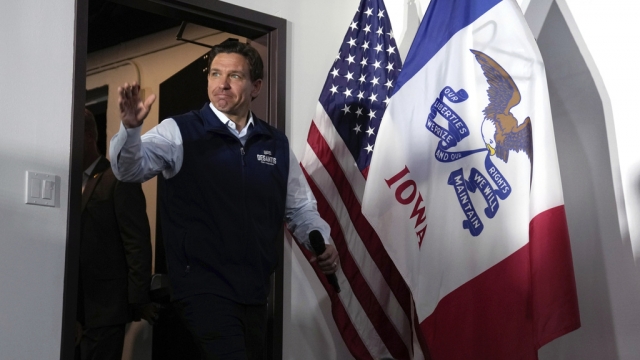Florida Gov. Ron DeSantis is suspending his presidential race two days before the New Hampshire primary, he announced with a video posted to X on Sunday.
DeSantis, once seen as Donald Trump's greatest opponent for the Republican presidential primary, was unable to peel away enough of Trump's supporters for his own campaign.
“It’s clear to me that a majority of Republican primary voters want to give Donald Trump another chance," he said in the video, endorsing Trump for the presidency.
The Florida governor came up short with a second-place finish in the Iowa caucuses last week, narrowly ahead of South Carolina governor Nikki Haley, and had already thrown in the towel for New Hampshire, instead spending the weekend campaigning in Haley's home state, whose primary election is in five weeks. New Hampshire's first-in-the-nation primary comes Tuesday.
He officially launched his 2024 presidential campaign on May 24, 2023, in a social media announcement that was plagued with technical glitches.
Early primary polls suggested DeSantis was in a strong position.
Heralding his state as a place “where woke goes to die,” DeSantis has framed his campaign around a desire to bring the conservative policies he championed in Florida to the national stage. He has made a name for himself battling with Disney over the entertainment giant's opposition to a bill dubbed by critics as the “Don’t Say Gay” law, which bans instruction or classroom discussion of LGBTQ issues in Florida public schools for all grades.
Under his governorship, the state has also banned abortions after six weeks of pregnancy and blocked public colleges from using federal or state funding on diversity programs.
Acknowledging the threat, Trump went after the Florida governor viciously in the months leading up to DeSantis’ May announcement and continued to pound him on the campaign trail, on social media and in paid advertising in the months that followed.
Yet many of DeSantis’ problems may have been his own doing.
In the subsequent weeks and months, DeSantis struggled to connect with voters on a personal level under the unforgiving bright lights of the presidential stage.
He irked some New Hampshire Republican officials in his campaign’s inaugural visit to New Hampshire by declining to take questions from voters, as is tradition in the state. And later, uncomfortable interactions with voters in other states were caught on camera as well.
Although he and his allies amassed a political fortune well in excess of $100 million, he faced serious financial challenges emerged over the summer.
By the end of July, DeSantis had laid off nearly 40 employees in a move designed to cut roughly one-third of his campaign payroll. The cuts came shortly after public filings revealed that he was burning through his substantial campaign coffers at an unsustainable rate.
Some people looking for a Trump alternative backed Haley, the former diplomat and South Carolina governor who gained popularity among many Republican donors, independent voters and the so-called Never Trump crowd.
DeSantis and Haley frequently attacked each other in debates and in advertising, often more directly than they went after Trump.
As internal financial concerns mounted, DeSantis turned aggressively to an allied super PAC to handle basic campaign functions such as organizing campaign events, advertising and an expansive door-knocking operation.
Federal law does not allow campaigns to coordinate directly with super PACs. In December, a nonpartisan government watchdog group filed a complaint with the Federal Election Commission, citing reporting by The Associated Press and others, alleging that the degree of coordination and communication between DeSantis’ campaign and the Never Back Down super PAC crossed a legal line.
DeSantis denied any wrongdoing and called the complaint “a farce.”
Still, the steady stream of negative developments leading up to the opening primary contests undermined the confidence of DeSantis’ donor network, which was supposed to be a major strength, and would-be supporters at the ballot box. As his polling numbers stagnated, DeSantis and his allies pulled back on their multistate strategy and focused virtually all of his resources on Iowa’s opening caucuses.
After leaving the 2024 presidential contest, the 45-year-old now refocuses his attention to the rest of his second and final term as Florida’s governor, which ends in January 2027.
SEE MORE: How long will this year's primary season go?
Trending stories at Scrippsnews.com




